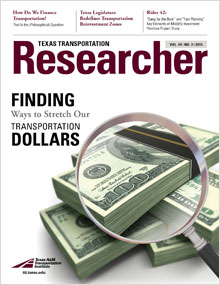Calling the fuel tax “a dying source of revenue,” attendees of the recent Symposium on Mileage-Based User Fees (MBUFs) in Nashville, Tenn., examined technology’s role in changing how we pay for road projects.
It was the fifth MBUF symposium sponsored by the Texas A&M Transportation Institute (TTI) and was held this year in conjunction with the Intelligent Transportation Society of America’s (ITS America’s) 23rd Annual Meeting and Exposition.
“We wanted to open the discussion with technology experts,” event organizer and TTI Research Engineer Ginger Goodin says. Goodin is also director of TTI Transportation Policy Research Initiative. “We’ve conducted these symposiums all over the country. We felt it was time to engage ITS America, and that group was very receptive and accommodating.”
ITS America “supports research and the subsequent implementation of alternatives to the gas tax — including a mileage based usage charge as one possibility — so as to provide a sustainable funding source for transportation improvements,” according to the organization.
The symposium examined multiple issues surrounding MBUFs, including the most recent research initiatives and pilot programs conducted in numerous states. Specifically, technology’s potential role in implementing a new funding source for transportation was the main topic of discussion.
“There’s a whole industry out there trying to get data from the vehicle,” says Chuck Larsen, road pricing information systems program coordinator with the Oregon Department of Transportation. “So, if you can piggyback and build on the existing foundations in the market today, the change to a user is perceived as a lot less.”
Oregon has been a leader in the study of MBUFs, conducting several pilot programs since its state legislature created a Road User Fee Task Force in 2001. Based on lessons learned from those pilot projects, Larsen says an MBUF program will only succeed if users are given numerous options on how mileage data are collected, including a non-technology option.
“I think we learned from the symposium that we don’t know exactly what an MBUF system will consist of in the future, but we do know that we have to build on a framework that is flexible and open and can leverage whatever new technology or approach that may emerge,” Goodin says. “And that is where research comes in.”

